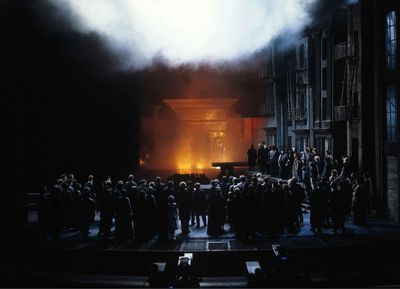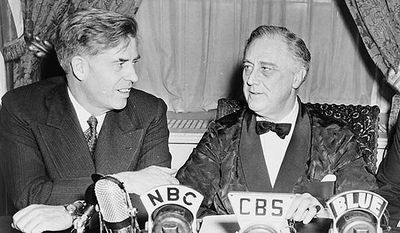Alex Ross's Blog, page 157
October 13, 2013
October 12, 2013
Miscellany for the Hunter's Moon
New-music news from the Met, in advance of the opening of Nico Muhly's Two Boys on Oct. 21: the company will present Kaija Saariaho's magnificent L'Amour de loin in the 2016-17 season, and Matthew Aucoin, David T. Little, and Joshua Schmidt have joined the company's "new works" program. As previously bruited, The Death of Klinghoffer is coming next season, and Thomas Adès's The Exterminating Angel will make its way to the house after its Salzburg première.... Frank Oteri, at NewMusicBox, combats misinformation about the demise of New York City Opera. It's sad that the head of AFM Local 802 seems to know so little about the history and mission of the company. Meanwhile, James Stewart has a grisly narrative of City Opera's financial suicide... The discussion of sexism in classical music continues: read thoughtful contributions by Justin Davidson and Anastasia Tscioulcas... Registre des lumières, a new work by Rest Is Noise favorite Raphaël Cendo, will be heard at the Donaueschingen Music Days on Oct. 19; there's a broadcast on SWR.... Attention arts journalists aged 18 to 35: Carnegie Hall is inviting you to participate in its David Lang workshop. The deadline is Oct. 15.... Russian anti-gay laws have drawn plenty of attention, and a few protests from within the classical world. The Overgrown Path asks why nary a peep has been heard about considerably more oppressive laws in Abu Dhabi, whose high-profile festival draws classical stars.... A première at the Liszt Festival Raiding on Oct. 20: Martin Haselböck has discovered an orchestral version of Liszt's Vexilla regis prodeunt.... Emily Thompson, author of the celebrated tome The Soundscape of Modernity, has developed a fascinating website called "The Roaring 'Twenties," allowing you to hear the noises of New York circa 1930.... Pure brainy pleasure: Ethan Iverson on Andreas Staier.
Miscellany for the Harvest Moon
New-music news from the Met, in advance of the opening of Nico Muhly's Two Boys: the company will present Kaija Saariaho's magnificent L'Amour de loin in the 2016-17 season, and Matthew Aucoin, David T. Little, and Joshua Schmidt have joined the company's "new works" program. As previously bruited, The Death of Klinghoffer is coming next season, and Thomas Adès's The Exterminating Angel will make its way to the house after its Salzburg première.... Frank Oteri, at NewMusicBox, combats misinformation about the demise of New York City Opera. It's sad that the head of AFM Local 802 knows so little about the history and mission of the company. Meanwhile, James Stewart has a grisly narrative of City Opera's financial suicide... The discussion of sexism in classical music continues: read thoughtful contributions by Justin Davidson and Anastasia Tscioulcas... Registre des lumières, a new work by Rest Is Noise favorite Raphaël Cendo, will be heard at the Donaueschingen Music Days on Oct. 19; there's a broadcast on SWR.... Attention arts journalists aged 18 to 35: Carnegie Hall is inviting you to participate in its David Lang workshop. The deadline is Oct. 15.... Russian anti-gay laws have drawn plenty of attention, and a few protests from within the classical world. The Overgrown Path asks why nary a peep has been heard about considerably more oppressive laws in Abu Dhabi, whose high-profile festival draws classical stars.... A premiere at the Liszt Festival Raiding on Oct. 20: Martin Haselböck has discovered an orchestral version of Vexilla regis prodeunt.... Emily Thompson, author of the celebrated tome The Soundscape of Modernity, has developed a fascinating website called "The Roaring 'Twenties," allowing you to hear the noises of New York circa 1930.... Pure brainy pleasure: Ethan Iverson on Andreas Staier.
October 10, 2013
Early Joyce
The Times's Zachary Woolfe sent me this excerpt from a 1997 Houston Grand Opera Macbeth, with Catherine Malfitano as the sleepwalking Lady Macbeth and, right at the start, a 28-year-old Joyce DiDonato as her lady-in-waiting. Earlier that year, DiDonato had made her professional debut, as a Slave in Houston's Salome, with Hildegard Behrens in the title role. Not yet available on YouTube, alas, is DiDonato singing Godspell at Bishop Miege High School. She performs this Sunday with James Levine and the Met Orchestra; a few tickets remain. I am given to understand that she has worked out a spectacular dance routine for Elliott Carter's Variations for Orchestra.*
*Just kidding. Although you never know.
October 9, 2013
Noted
Verdi 200
Callas and Di Stefano in La Traviata, at La Scala, 1955; Don Carlos at the Vienna State Opera in 2004, as directed by Peter Konwitschny. In 2001 I wrote an essay on Verdi, which is reprinted in revised form in Listen to This. It ends thus:
The greatness of Verdi is a simple
thing. Solitary by nature, he found a way of speaking to limitless
crowds, and his method was to sink himself completely into his characters. He
never composed music for music’s sake; every phrase helps to tell a story.
The most astounding scenes in his work are those in which all the voices
come together in a visceral mass— like a human wave that could carry
anything before it. The voices at the end of Simon Boccanegra, crying out in grief; the voices at the end of Un ballo, overcome by the spiritual
magnificence of a dying man; and, of course, the voices of “Va pensiero,”
remembering, in a unison line, the destruction of Jerusalem. In the modern world,
we seldom find ourselves in the grip of a single emotion, and this is
what Verdi restores to us— the sense of belonging.
October 7, 2013
For Patrice Chéreau
A catastrophe: Patrice Chéreau died today in Paris, of lung cancer, at the age of sixty-eight. The storied director of opera, theater, and film had been undergoing treatment for cancer while preparing his production of Strauss's Elektra in Aix-en-Provence this past summer; I am told that he continued working despite the enormous physical strain. His contribution to opera, from the epoch-making 1976 Bayreuth Ring onward, was tremendous; he perfected a mode of abstracted realism in which everything was charged and nothing was forced. Even the slightest gestures and the most marginal characters contributed to the unfolding of the drama, which built toward shuddering visual epiphanies: the swinging of the pendulum in Die Walküre, and its eventual halt; Jack the Ripper's slow ascent of the stairs in Lulu, into moonlit nothingness; the sudden, terrifying deluge of trash in From the House of the Dead; most momentously, at the end of Götterdämmerung, the turning of the onstage crowd toward the audience, as if to ask, in Alain Badiou's words, "What about you? Here is where we stand now, you and we both." I attended the last night of the Elektra in Aix, which proved to be the final work of Chéreau's career. I won't soon forget either the performance itself or the intensity of the ovation that followed. When greatly gifted people die prematurely, we feel not only saddened but deprived. The future seems to contain empty lots on which nothing will be built.
More: Pierre Boulez, Esa-Pekka Salonen, Mark Berry, Manuel Brug, Armelle Héliot, Allan Kozinn's Times obituary.
Female conductors, cont.
Just as I was posting my online piece "Women, Gays, and Classical Music" last week, a controversy was erupting in France over comments uttered by the composer Bruno Mantovani, the director of the Paris Conservatoire for music and dance. Chris Swithinbank has a full report and a translation of Mantovani's remarks, which include the following: "The profession of a conductor is a
profession that is particularly testing physically; sometimes
women are discouraged by the very physical aspect: conducting,
taking a plane, taking another plane, conducting again." It is tempting to pile invective upon such thoughtless statements. For one thing, the "physical aspect" or the "problem of maternity" hardly impedes the careers of female pianists, violinists, or opera singers. What is the difference with conducting? Entirely one of image: the art of conducting is wrapped up in mythologies of male power. But it would be more constructive for every male participant in this discussion to examine himself, his record, his biases, spoken or unspoken. I do not exclude myself: as many readers noted, my book The Rest Is Noise failed to give adequate attention to female composers, and a review of my New Yorker pieces would find a severe gender imbalance. (I believe I've done somewhat better on this blog, at least in recent years.) The blurtings of Petrenko, Temirkanov, and Mantovani are extreme instances from which it is easy for the rest of us to distance ourselves, but silent neglect can do just as much damage as open contempt.
Previously: Even the Score.
Heartbreak
Reports of Osmo Vänskä's final concerts with the musicians of the Minnesota Orchestra: Jim Oestreich, Kristin Tillotson (with video), Michael Moore, Rob Hubbard.
Henry Wallace
Alex Ross's Blog
- Alex Ross's profile
- 425 followers






